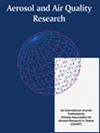评估多个COALESCE网络站点上低成本PM传感器的性能
IF 2.5
4区 环境科学与生态学
Q3 ENVIRONMENTAL SCIENCES
引用次数: 2
摘要
空气质量是一个全球关注的问题,颗粒物因其对人类健康和气候变化的影响而受到相当大的关注。低成本传感器的最新进展使其能够大量部署以测量时空和实时空气质量数据。低成本传感器需要通过监管机构批准的方法和其他数据集进行仔细评估,以了解其功效。在这项工作中,通过与基于卫星的MERRA-2模型和SASS参考仪器进行比较,评估了在四个区域站点部署低成本传感器测量的PM浓度。分析了2020年1月至2020年7月印度四个区域站点的PM2.5质量浓度日变化,包括封城前和六个不同的封城时期。在封锁前期间,罗赫塔克的PM2.5浓度(119 μ g -3)高于马哈巴利什瓦尔(33 μ g -3)、博帕尔(45 μ g -3)和克什米尔地区。封锁期间各地点PM2.5质量浓度均较封锁前显著降低,但各地点PM2.5浓度存在差异。两项测量的空气质量趋势非常相似,但MERRA-2重建的PM2.5在封城前明显低于封城后。在低成本传感器测量和MERRA-2再分析数据之间观察到显著差异。这要归功于MERRA-2模型分析,与地面测量相比,它测量的PM2.5浓度更低,而低成本的传感器存在误差。本文章由计算机程序翻译,如有差异,请以英文原文为准。
Evaluating the Performance of Low-cost PM Sensors over Multiple COALESCE Network Sites
Air quality is a global concern, with particulate matter receiving considerable attention due to its impact on human health and climate change. Recent advances in low-cost sensors allow their deployment in large number to measure spatio-temporal and real-time air quality data. Low-cost sensors need careful evaluation with both regulatory approved methods and other data sets to understand their efficacy. In this work, PM concentrations measured by deploying low-cost sensors at four regional sites are evaluated through comparison with satellite-based model MERRA-2 and the SASS reference instrument. Daily PM2.5 mass concentration variation was analyzed at four regional sites of India from January 2020 to July 2020, including pre-lockdown and six different lockdown periods. Higher PM2.5 concentration was observed at Rohtak (119 mu g m-3) compared to Mahabaleshwar (33 mu g m-3), Bhopal (45 mu g m-3) and Kashmir sites during the pre-lock down period. During the lockdown period, the PM2.5 mass concentration was reduced significantly compared to the pre-lockdown period at every location, although the PM2.5 concentration was different at each location. The air quality trend was quite similar in both the measurements, however, MERRA-2 reconstructed PM2.5 was significantly lower in the pre-lockdown period compared to the lockdown periods. Significant differences were observed between low-cost sensor measurements and MERRA-2 reanalysis data. These are attributed to the MERRA-2 modelling analysis that measures less PM2.5 concentration as compared to ground-based measurements, whereas low-cost sensor are and biases.
求助全文
通过发布文献求助,成功后即可免费获取论文全文。
去求助
来源期刊

Aerosol and Air Quality Research
ENVIRONMENTAL SCIENCES-
CiteScore
8.30
自引率
10.00%
发文量
163
审稿时长
3 months
期刊介绍:
The international journal of Aerosol and Air Quality Research (AAQR) covers all aspects of aerosol science and technology, atmospheric science and air quality related issues. It encompasses a multi-disciplinary field, including:
- Aerosol, air quality, atmospheric chemistry and global change;
- Air toxics (hazardous air pollutants (HAPs), persistent organic pollutants (POPs)) - Sources, control, transport and fate, human exposure;
- Nanoparticle and nanotechnology;
- Sources, combustion, thermal decomposition, emission, properties, behavior, formation, transport, deposition, measurement and analysis;
- Effects on the environments;
- Air quality and human health;
- Bioaerosols;
- Indoor air quality;
- Energy and air pollution;
- Pollution control technologies;
- Invention and improvement of sampling instruments and technologies;
- Optical/radiative properties and remote sensing;
- Carbon dioxide emission, capture, storage and utilization; novel methods for the reduction of carbon dioxide emission;
- Other topics related to aerosol and air quality.
 求助内容:
求助内容: 应助结果提醒方式:
应助结果提醒方式:


